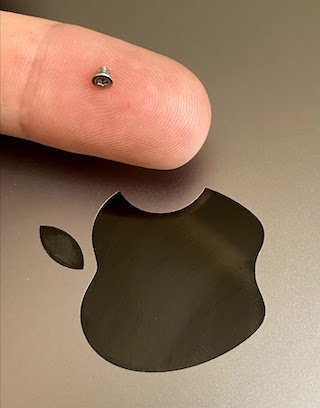|
Today's Opinions, Tomorrow's Reality
Beware the Evil Pentalobe By David G. Young Washington, DC, July 13, 2021 -- The tech industry has boosted profits and abused consumers by designing products to prevent repair. Those days may be coming to an end. The pentalobe 5 is a notorious beast. It’s not a monster, nor a weapons system — it is tiny little screw. Despite its small size, it has frustrated millions of Apple product owners in their frantic efforts to repair their own devices.
Apple invented the pentalobe 5 as its first line of defense against "unauthorized" repairs. On the MacBook Pro, it is just 1.5 millimeters wide (an even smaller version is used on the iPhone). It is designed to match a microscopic lobe-shaped bit. Five of these rounded lobes give the screw its name, and are easily stripped by novices unless the screwdriver is held perfectly straight and firm. Even the slightest mis-twist (or heaven forbid the use of an incompatible but similar torx screwdriver) will grind tiny flakes of metal off of the screw head, stripping it and rendering it permanently unremovable. Just to open the bottom panel of a 2015 MacBook Pro, you have to remove 10 of these demons perfectly. Just a single bad twist and you are sunk. This Apple invention is known as a tamper- resistant screw, because it requires a tool that's obscure and difficult to use. Apple claims this is meant to protect the customer form unskilled repair shops or worse yet, hardware hackers. Nonsense. My old Dell laptop used screws with a standard Phillips head (all of which are large enough to be visible with the naked eye), and somehow I managed to keep hackers from secretly opening up my case while using the laptop with non-tamper resistant screws in (gasp!) public coffee shops. In reality, the pentalobe is evil. It is solely designed to keep you, the product owner, from tampering with the hardware that you ostensibly own. Apple has all kinds of excuses -- you might shock yourself on the battery if you open the case! But the real reason it uses the pentalobe is to drive revenue. Apple knows that if you can't fix it yourself, you will either buy a new one, take the product into the Apple store to pay them to do it, or even be frightened into buying an expensive Apple Care extended warranty. This makes the company hundreds of billions of dollars each year. (Full disclosure: I love the returns I get from my Apple stock while simultaneously fuming at the restrictions Apple puts on its products.) The pentalobe screw is just the beginning. Even if you manage to pry your Apple product open, you will be frustrated by batteries glued into place, proprietary connectors on otherwise commodity components, and firmware checks on hardware integrity that might brick your device if you dare to swap something out. Apple's attempts at total control might make Stalin blush. The resistance against Apple has been led by a company called iFixit for almost 20 years. The rebel company sells tools and publishes free guides for do-it-yourself repairs of Apple and other products. It is the de-facto central publishing house and quartermaster of the "right-to repair" movement. After falling afoul of Apple's evil army of lawyers on more than one occasion, they were banned in Apple's AppStore for violating non-disclosure agreements. Fortunately, unlike China, Apple has no great firewall capable of blocking the iFixit website. At least not yet. IFixit long ago invented and published a "repairability index" which they use to rate various computers and smartphones. The French government recently copied this idea, and will soon require all products sold in France to disclose a rating based on France's similar system also based on a scale of 1 to 10.1. Meanwhile, in the United States, the so-called "right to repair" movement has also picked up steam. In May, the Federal Trade Commission delivered a report to Congress calling out bad behavior in the industry that tries to prevent consumers from repairing products.2 Yesterday, the Biden administration announced plans to have the FTC issue new regulations to restrict some of these acts.3 Even if government regulators fail in curtailing the worst abuses of hardware manufacturers, public opinion and demanding consumers may ultimately force them to do so. Last week, Steve Wozniak, the co-founder of Apple declared he is "totally supporting" of the cause.4. While he no longer has any role at Apple, he remains an influential voice in the industry. While Apple will certainly drag its feet on change, the growing chorus of voices speaking out against its worst practices will increasingly hard to ignore. With luck, the days of the notorious pentalobe may be nearing an end. Related Web Columns: From Savior to Despot, September 6 2011 Is It Yours? April 5, 2011 Notes: 1. Wired, Why France’s New Tech ‘Repairability Index’ Is a Big Deal', February 28, 2021 2. Federal Trade Commission, nixing the Fix: An FTC Report to Congress on Repair Restrictions', May 2021 3. ZDNet, The Right to Repair Order Could Make Fixing Your Smartphone Easier and Cheaper', July 12, 2021 4. CNN, Apple Co-Founder Steve Wozniak: 'It's Time to Recognize the Right to Repair', July 9, 2021 |


